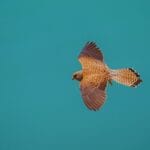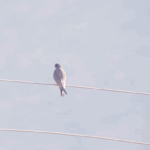Did you know that Albania used to be home to four species of vultures (Cinereous Vulture, Bearded vulture, Griffon Vulture and the Egyptian Vulture), and that out of those four, the Egyptian Vulture is the last breeding vulture in our country? This species is listed as Globally Endangered by the IUCN, and some of its breeding territories are found in the Balkan Peninsula, where multiple conservation actions have been carried out in recent years.
Join us on the Conservation Defined Podcast to learn all about the conservation efforts for the Egyptian vulture in the region, as we dive into the fascinating world of wildlife conservation. In this episode, we’re thrilled to have Victoria Saravia, the national coordinator for the Egyptian Vulture New Life project in Greece, as our special guest.
Victoria shares her inspiring journey and sheds light on the challenges faced in protecting this unique bird species. From combating illegal poison baits to addressing threats across the bird’s migratory route, learn about the conservation actions being taken in Greece, the Balkans, and Africa.
“It’s been really eye-opening for us, the data that tagged individual, Aoos, has given us. And it’s really nice to see how loyal these birds are. I mean, they go every year to the same nest. They come practically on the same date. They leave practically on the same date again. So it’s really interesting to see the ecology of these birds, thanks to the satellite transmitter,” – says Victoria on the use of satellite transmitters.
Tune in to learn more about the incredible use of satellite transmitters, which provide valuable insights into the Egyptian vulture’s behavior and migration patterns, and find out how collaborative efforts between countries play a crucial role in ensuring the bird’s survival.
Listen now on your favorite podcast platform:
The Conservation Defined series is an AOS production supported by the Critical Ecosystem Partnership Fund (CEPF), within the framework of the “Maintaining the Ecological Integrity and Biodiversity of Divjaka- Karavasta National Park” project.






